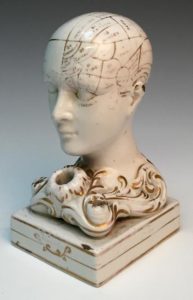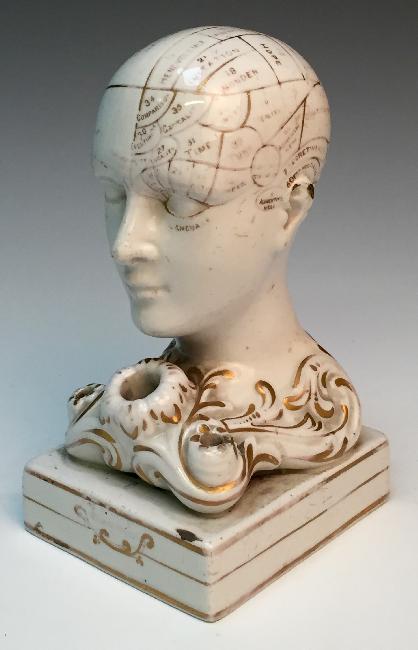Was Poe Convinced that Phrenology is a Science?
Murray Ellison | Jan. 8, 2018
Excerpts from Murray’s VCU Master of Arts Thesis on Poe and Science © 2015
 Poe continued his interest in spectacular news stories that blurred the lines between fact and fiction in an 1836 review on this topic: “A Review of Phrenology and the Moral Influences of Phrenology.” During the nineteenth century, there had been many debates among scientists whether Phrenology was a legitimate science or a pseudo-science. Advocates of this belief often used emotional appeals and anecdotal testimonials in order to “prove” that their views were supported by empirical science. This subject also received intense interest from the public and much coverage in the newspapers and magazines that Poe would have been exposed to as a journalist. Thus, it is likely that Poe was assigned by his editor to investigate this topic. Later in 1836, Poe wrote a more extensive report for the Southern Literary Messenger titled, “Phrenology and the Moral Influence of Phrenology,” which has been reprinted in James A. Harrison’s Complete Works of Edgar Allan Poe, Volume VIII.
Poe continued his interest in spectacular news stories that blurred the lines between fact and fiction in an 1836 review on this topic: “A Review of Phrenology and the Moral Influences of Phrenology.” During the nineteenth century, there had been many debates among scientists whether Phrenology was a legitimate science or a pseudo-science. Advocates of this belief often used emotional appeals and anecdotal testimonials in order to “prove” that their views were supported by empirical science. This subject also received intense interest from the public and much coverage in the newspapers and magazines that Poe would have been exposed to as a journalist. Thus, it is likely that Poe was assigned by his editor to investigate this topic. Later in 1836, Poe wrote a more extensive report for the Southern Literary Messenger titled, “Phrenology and the Moral Influence of Phrenology,” which has been reprinted in James A. Harrison’s Complete Works of Edgar Allan Poe, Volume VIII.
In this second SLM article, Poe reported on the “General Study” and “Discoveries” of Phrenology that were conducted by Gall, Spurzheim, and others. His account of the works of several of the “prominent” persons conducting research on phrenology demonstrates that he was interested in exploring a broad range of popular science-related topics. However, a careful reading of his commentaries also reveals that he maintained journalistic neutrality on a subject that was being questioned at that time by the public as well as by the professional scientific community. In his report, Poe assures readers that “Phrenology is no longer to be laughed at. It has assumed the majesty of a science; and, as a science, ranks among the most important which can engage the attention of thinking beings” (Collected Writings 8: 252). His use of the wording, “assumed the majesty of a science” indicates that he is enthusiastic about reporting on the subject, while also remaining personally non-committal concerning whether Phrenology is a valid area of scientific investigation. He maintains journalistic neutrality when he reports that the study of this science is “very extensively accredited in Germany, in France, in Scotland, and in both Americas.” He describes how a single lecture, in Scotland by Dr. Spurzheim “gained five hundred converts to Phrenology…Northern Athens is now a stronghold for the faith” (252). His use of the words “converts” and “faith” indicates that he may not have been convinced that Phrenology was as much of a hard science as many of its believers claimed. During this period, most scientists and religious leaders rejected the claims that there were connections between empirically-based fields of science and faith-based spiritual practices. Poe reports that its followers claim that with a well-directed inquiry of Phrenology, “Individuals may obtain, through the science, a perfectly accurate estimate of their moral capabilities…and will be better fitted for decision in regard to a choice of offices and duties in life” (253). It is difficult to determine whether those reporters’ extraordinary claims are serious or “tongue in cheek.” Therefore, his documentation of Phrenology’s classification system could be read as a serious scientific description, or as a satirical expose—depending on whether readers agree or disagree that it is a science.
Poe writes that the study and classification system of Phrenology is often divided into the two main categories of “Instinctive Propensities and Sentiments,” and “Intellectual Faculties.” The former category includes the traits of “Domestic Affections, Preservative Faculties, Prudential Sentiments, Regulating Powers, Imaginative Powers, and Moral Sentiments.” As an example, “Domestic Affectations” include Embraces, Philopregentiveness, Inhabitiveness, and Attachment. The second main category, “Intellectual Faculties,” is divided into “Observing, Scientific, Reflecting, and the Subservient Faculties—which is language.” In another example, “Reflecting Faculties” include Eventuality, Comparison, Causality, and Wit” (254).
Poe concludes his report by noting that studies of Phrenology have emphasized that the particular shape of a person’s head may denote particular talents or dispositions. He writes that “Edinensis” reported that the brain and head of an “Idiot” may be very small and that large headed people may be marked with animal tendencies. He writes that “Gall” claimed that a person who has a skull “Which is elevated or high above the ears…and thrown forward, so as to be nearly perpendicular with its base, may be presumed to lodge a brain of greater power…than a skull deficient in such proportion” (255).
After reading Poe’s journalistic reporting, it is difficult to determine whether he believed in Phrenology. Although he provided several testimonials from people of that “faith,” he provided no personal statement on that subject. Therefore, it is difficult to conclude if Poe’s story was more likely influenced by the public’s interest in Phrenology or by his belief that it was or was not a science. Yet, we can see in Poe’s reports that he revealed many interesting details and flaws about this subject. It must be noted again here, that this topic was considered by many to be a legitimate subject of scientific inquiry in the nineteenth century. Regardless of whether Poe believed these accounts were credible, they provided him with a phrenological framework for the descriptions and features of several characters in his later fictional works, such as “The Tell-Tale Heart,” and “The Fall of the House of Usher.” We shall discuss these characteristics in my later discussions about Poe’s science-based fiction. In next month’s blog, I will begin a two-part series on Poe’s interest in puzzles and Cryptography.
Selected References
Poe, Edgar Allan. The Complete Works of Edgar Allan Poe Volume VIII: Early Criticism I. Ed. Harrison, James A. New York: T. Crowell, 1902.


